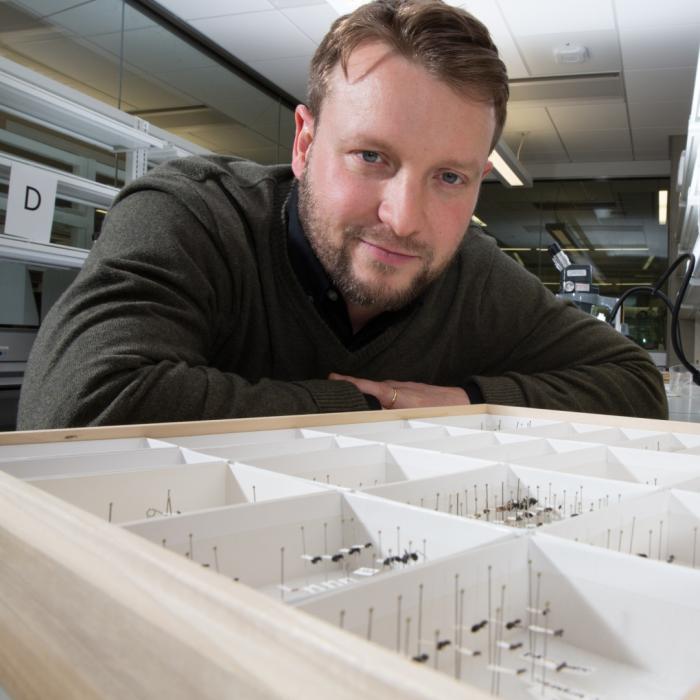Scott Powell

Scott Powell
Professor of Biology
Systematics, Evolution & Ecology
Contact:
Expertise
Community and Evolutionary Ecology, Tropical Biology, Ant Biology
In the Powell Lab, we work on research questions at the interface of community ecology and evolutionary biology. We primarily use ants to tackle these questions. We are particularly interested in the intimately connected questions of how species interactions have shaped trait diversification, and how species traits influence the assembly of contemporary communities. Please visit the lab website for more information, including ongoing research in the lab, current lab members, and a full list of publications.
**Please note that I am always on the lookout for dedicated and enthusiastic undergraduate and graduate students. If you are interested in the kind of research we do, I would love to talk with you about current research opportunities in the lab.
Ph.D., Biological Sciences, University of Bristol, U.K., 2005.
M.S., Ecology and Evolutionary Biology, University of Connecticut, U.S.A., 2000.
B.S., Biological Sciences, Florida State University, U.S.A., 1997.
Camarota, F., Powell, S., Vasconcelos, H.L., Priest, G. & Marquis, R.J. (2015) Extrafloral nectaries have a limited effect on the structure of arboreal ant communities in a Neotropical savanna. Ecology, 96: 231-240.
Powell, S., Del-Claro, K., Feitosa, R.M. & Brandão, C.R.F. (2014) Mimicry and eavesdropping enable a new form of social parasitism in ants. The American Naturalist, 184: 500-509.
Price, S.L. Powell, S., Kronauer, D.J.C., Tran, L.A.P., Pierce, N.E. & Wayne, R.K. (2014) Renewed diversification is associated with new ecological opportunity in the Neotropical turtle ants. Journal of Evolutionary Biology, 27: 242-258.
Powell, S. & Dornhaus, A. (2013) Soldier-based defences dynamically track resource availability and quality in ants. Animal Behaviour, 85: 157-164.
Powell, S., Costa, A. N., Lopes, C. T. & Vasconcelos, H. L. (2011) Canopy connectivity and the availability of diverse nesting resources affect species coexistence in arboreal ants. Journal of Animal Ecology, 80: 352–360.
Kaspari, M., Powell, S., Lattke, J. & O’Donnell, S. (2011) Predation and patchiness in the tropical litter: do swarm raiding army ants skim the cream or drain the bottle? Journal of Animal Ecology, 80: 818–823.
Powell, S. (2009). How ecology shapes caste evolution: Linking resource use, morphology, performance, and fitness in a superorganism. Journal of Evolutionary Biology, 22: 1004–1013.
Powell, S. (2008). Ecological specialization and the evolution of a specialized caste in Cephalotes ants. Functional Ecology, 22: 902–911.
Powell, S. & Franks, N. R. (2006). Ecology and the evolution of worker morphological diversity: a comparative analysis with Eciton army ants. Functional Ecology, 20: 1105-1114.
Powell, S. & Franks, N. R. (2005). Caste evolution and ecology: a special worker for novel prey. Proceedings of the Royal Society B: Biological Sciences, 272: 2173-2180.

